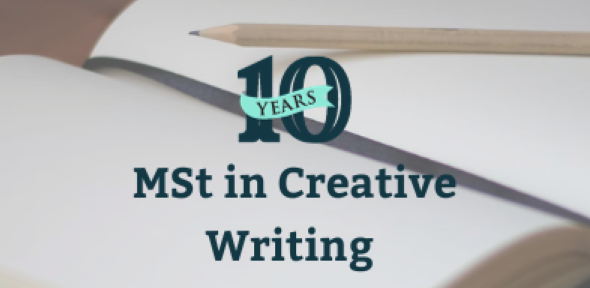Institute of Continuing Education (ICE)

Submitted by Ella Brooker on Wed, 18/10/2023 - 10:09
This year marks a decade of the Creative Writing Master’s (MSt) at ICE. Over that period the programme has grown in popularity and its students have achieved success in many different fields and across the world.
A diverse and unique course
ICE’s Creative Writing MSt allows students to explore a range of different genres and to develop new skills. Students experiment with poetry, fiction, writing for performance and creative non-fiction in their first year before specialising in their dissertation. The structure of the programmes allows students to develop their expertise before they focus on their key area of interest. This approach means that students may join the course with one project in mind but decide to concentrate in a completely unexpected genre. Someone might, for example, intend to write a memoir but decide that they enjoyed the writing for performance module so much that they want to write a sitcom for their dissertation.
Tutors are all published authors
The programme was launched by Dr Sarah Burton and Professor Jem Poster and taken over after five years by Dr Midge Gillies. Dr Joe Reed and Rupert Wallis are now leading the two cohorts under the guidance of Academic Director Dr Yvonne Battle-Felton and with support from English Literature Academic Director, Dr Jenny Bavidge.
Dr Midge Gillies reflects back on her experience of the MSt:
“Tutors, guest speakers and, most of all, students have helped the programme to keep pace with the ever-changing world of creative writing. Our students come from around the world and from a huge range of backgrounds. It is this diversity that enriches the MSt and ensures that students learn from one another and from studying different forms of writing – whether that’s how to write a sonnet or a piece of flash fiction, an audio drama or a personal essay.The programme has something for everyone but its tutors and students are constantly challenging what it means to be a writer in today’s world.”
The programme has expanded and now has two cohorts of students taught by a range of talented authors, all of whom are published. Students have the opportunity to learn from experts in their field and are supported by Teaching Associates: Dr Alycia Pirmohamed, Dr Lucy Durneen, Dr Nick Bradley and Dr Joanne Limburg.
In 2019 the programme was joined by two other MSts: one in Writing for Performance and one in Crime and Thriller Writing.
Student Story
Linseigh Green sums up what the course has meant to her : “The programme left me with an incredible group of friends, a really strong, supportive writers network- they were really there for me, especially when I was dealing with bad dips in my health.”
You can find out more about Linseigh’s student story by watching this video.
Alumni Success
Students join the programme with different goals and some go on to become published authors. The following are just a few of the alumni who have seen their work in print or on the stage or screen:
Ellen Atlanta was one of the winners of the 2022 Royal Society of Literature Giles St Aubyn Awards, celebrating non-fiction writing. Her forthcoming book, Pixel Flesh: Modern Beauty Culture and The Women It Harms explores women’s relationship to beauty and digital feminism through conversation and intimate observation.
Kate Barton’s play, Fast, appeared at the Park Theatre in North London after sell-out shows at the Brighton and Edinburgh Fringe. It was shortlisted for Best New Play Award in 2018 by New Writing South. The play follows the true story of Linda Hazzard who advocated a fasting cure that gripped the press and divided the nation.
Sara Collins’ historical novel, The Confessions of Frannie Langton was published by Viking and won the Costa Book Awards First Novel in 2019. The book tells the story of a love affair between a Jamaican maid and her French mistress in 19th century London and has since been adapted by ITV. The novel started life as Sara’s dissertation.
Ricardo Lemos started his novel Desaparecida in his second year on the MSt and went on to finish it and translate it into his native language of Portuguese. It was published by Editora Guerra & Paz in 2021.
Laura Shepperson’s novel The Heroines became an instant Sunday Times bestseller. It is a feminist retelling of a familiar myth set in Ancient Greece.
A F Steadman (Annabel Church)’s Skandar fantasy series is aimed at eight-to-twelve-year-olds. The first three books secured what was believed to be the largest advance ever paid to a debut children’s writer. The first in the series has been translated into at least 38 languages, and a film script is in development.
Further Study
Several MSt graduates have progressed to further study. Some have chosen to embark on a PhD in Creative Writing or English Literature or have studied on ICE’s Postgraduate Certificate in Teaching Creative Writing. The PG Cert, which launched in 2019, has attracted many MSt graduates who want to share their knowledge of creative writing in a range of settings such as libraries, community centres and hospitals, as well as more traditional academic venues.
If you feel inspired to see where creative writing will take you and to follow in the footsteps of ten years of writers, you can find out more about the Creative Writing MSt here.
Applications are now open for for the 2024-2026 intake and will close on 17 January.